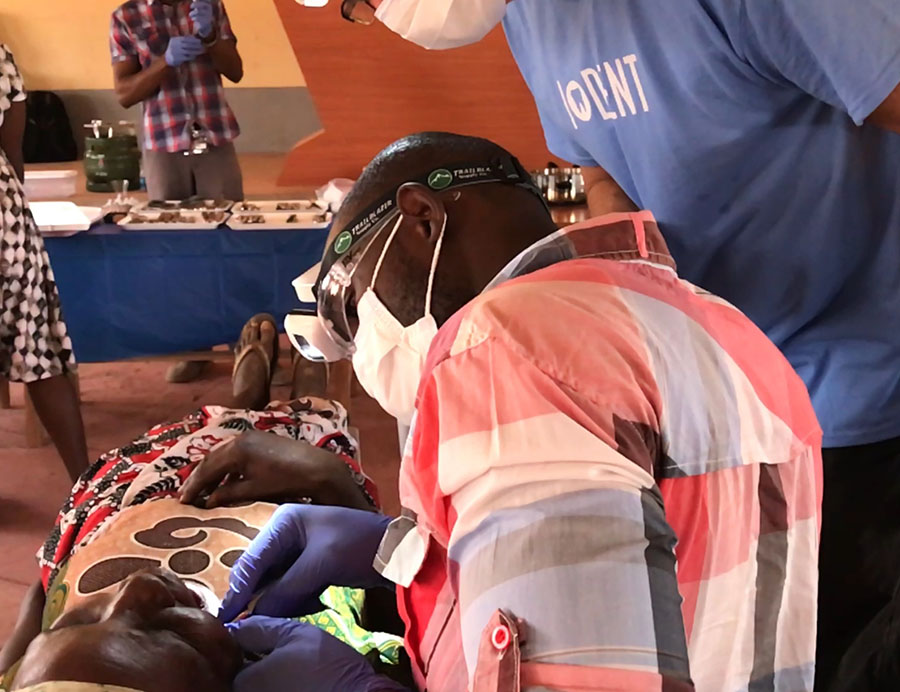Which Aroma Are You?
But thanks be to God, who in Christ always leads us in triumphal procession, and through us spreads the fragrance of the knowledge of Him everywhere. For we are the aroma of Christ to God among those who are being saved and those who are perishing, to one a fragrance from death to death, to the other a fragrance from life to life.
-2 Corinthians 2:14-16
The ITEC team recently returned from East Africa where multiple trainings were conducted simultaneously: I-DENT, I-FILM, I-MED, and I-SEE. While most of the time was spent in a village outside of the capital city, the I-DENT and I-SEE trainers/trainees traveled 30 km east of the training location on Thursday and Friday to conduct dental and eyeglasses clinics.
On that Friday, a lady came to the dental training visibly swollen (see photo). Our partner made us aware of her situation. As one of the dentists on the team, I went out to the waiting area to examine her. The woman had two necrotic teeth on the upper right that were both broken off at the gumline, one of which was causing a buccal space infection (hence the swelling).

Our group consisted of eight trainees, some who had previous training/dental experience and some who were totally new to dentistry. One of the students was a man named Umal from Uganda. mPower Approach had been to Uganda a year earlier where Umal had received training in extractions. Under my supervision, Umal anesthetized the lady's upper right quadrant and took out both of the necrotic teeth: the upper right third molar and the upper right second premolar.
After the teeth were removed, Umal proceeded to squeeze the affected area in order to drain the infection. A yellow river of ungodliness started to exude from the socket of the upper right second premolar. Needless to say, it did not smell like the aroma of Christ that the Apostle Paul talked about in 2 Corinthians chapter 2. I told Umal to stop so that we could have the other students see what was happening. We gathered all the other trainees around and then he resumed draining the buccal space infection through the socket of the recently removed tooth.
This case was an excellent example for the students to see. During the week, we had talked to the students about the "unholy trinity" of bacteria, sugar, and time. These are the factors that cause tooth decay. We also tried to emphasize to the students the importance of always removing the source of the infection, establishing drainage (when possible), and then prescribing antibiotics. While antibiotics are a great adjunct, they are never a substitute for definitive care.
There are a lot of spiritual parallels here. The Bible describes us as being "dead in our transgressions and sins" (Ephesians 2:1). Contrary to common cultural belief, Jesus warned that our problems stem not from our environment, but rather from within us: "What comes out of a person is what defiles him. For from within, out of the heart of man, come evil thoughts . . . All these evil things come from within, and they defile a person" (Mark 7:20-23).
Pus is nothing more than dead cells. Opposite of sin, the decay started from the outside in: first in the enamel, then to the dentin, and eventually the pulp. The bacteria then went from inside the tooth to outside the tooth. The bacteria eventually perforated the cheek side bone and started to spread into the soft tissue (hence the space infection).
The problem is only resolved when the offending source (in this case the tooth) is removed. When I was in Papua New Guinea back in 2013, I noticed that the same word "rausim" that is used to describe extracting a tooth was also the same word that they used for Jesus removing our sins. This makes for an easy transition for our students to go from talking about dental decay to spiritual decay.
Seeing the lady with the buccal space infection reminded me of why we do these dental trainings. The nice thing is that we are leaving behind people who can deal with necrotic teeth the other 51 weeks of the year when we are not there. As they remove sources or potential sources of pain and/or infection, it gives them tremendous opportunities for evangelism. It enables them to remove the aroma of death and "spread the aroma of the knowledge of Him everywhere" (2 Corinthians 2:14).

